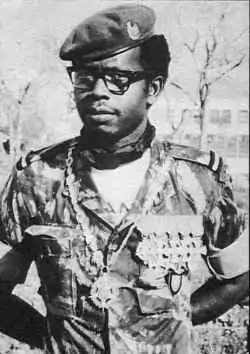
Marcelino da Mata (7 May 1940 – 11 February 2021) was a Portuguese Army officer, born in Portuguese Guinea.[1][2]
Early life and education
Marcelino da Mata was born in Ponte Nova, Portuguese Guinea and studied until completing the entire secondary education in Portuguese Guinea. When his older brother was conscripted into the military service he took his place. This began Marcelino da Mata's military career.
Military career
In the army, he distinguished himself as a polyglot with understanding of many local and regional languages and dialects. His linguistic skills were useful and in high demand for the army. He served in Portuguese Guinea. His experience would cause him to enroll in special operations training courses, eventually graduating as a commando. In the following years, Marcelino da Mata would become distinguished for numerous acts of valor during the Portuguese Colonial War. Having participated in 2,412 operations, he is the most decorated Portuguese military officer in the history of the Portuguese Army.[3] Demobilized by the departing Portuguese military authorities after the Carnation Revolution of 1974 in Lisbon and the independence of Portuguese Guinea, a total of 7,447 black Guinea-Bissauan African soldiers who had served in Portuguese native commando forces and militia were summarily executed by the PAIGC after the independence of the new African country.[4][5][6] He managed to avoid the same fate of other Portuguese African soldiers in Guinea-Bissau as he was in mainland Portugal undergoing convalescence due to a wound caused by a firearm accidentally shot by another Portuguese soldier shortly after the Carnation Revolution (which effectively ended the war) had taken place in Greater Lisbon, where he would live the rest of his entire life. He was subjected to torture by elements of the Portuguese far-left in 1975 during a tumultuous revolutionary period called Processo Revolucionário em Curso (PREC).[7]
Death
He died from COVID-19 related complications at the Professor Doutor Fernando Fonseca Hospital (also known as Amadora-Sintra Hospital) in Amadora, Portugal, on February 11, 2021, at age 80, during the COVID-19 pandemic in Portugal.[8]
References
- ↑ "Marcelino da Mata. "As memórias foram enterradas vivas e nunca foi feito o funeral"". www.dn.pt. 16 February 2021.
- ↑ "Marcelo e várias patentes militares no funeral de Marcelino da Mata". www.dn.pt. 15 February 2021.
- ↑ "Dos Combatentes do Ultramar". Archived from the original on 2009-04-06. Retrieved 2009-11-06.
- ↑ Lloyd-Jones, Stewart, and Costa Pinto, António, The last empire: thirty years of Portuguese decolonization, Portland, Oregon: Intellect Books, ISBN 1-84150-109-3, p. 22
- ↑ PAIGC, Jornal Nô Pintcha, 29 November 1980: In a statement in the party newspaper Nô Pintcha (In the Vanguard), a spokesman for the PAIGC revealed that many of the ex-Portuguese indigenous African soldiers that were executed after cessation of hostilities were buried in unmarked collective graves in the woods of Cumerá, Portogole, and Mansabá.
- ↑ Munslow, Barry, The 1980 Coup in Guinea-Bissau, Review of African Political Economy, No. 21 (May–Sep., 1981), pp. 109–113
- ↑ "GOSTAVA QUE MAIS JORNAIS TIVESSEM REFERIDO QUE MARCELINO DA MATA FOI TORTURADO PELO MRPP", António Lobo Xavier, TVI https://tvi24.iol.pt/videos/opiniao/gostava-que-mais-jornais-tivessem-referido-que-marcelino-da-mata-foi-torturado-pelo-mrpp/602da1270cf2951d9a0ca3b6
- ↑ Alvarez, Luciano (11 February 2021). "Morreu Marcelino da Mata, o militar mais condecorado do Exército". PÚBLICO.